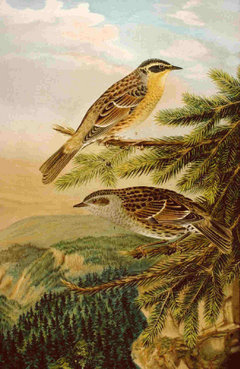| Accentor | ||||||||||||
|---|---|---|---|---|---|---|---|---|---|---|---|---|

P. montanella (top) and P.
modularis (bottom)
|
||||||||||||
| Scientific classification | ||||||||||||
|
||||||||||||
| See text. |
The accentors are in the only bird family, Prunellidae, which is completely endemic to the Palearctic. This small group of closely related passerines are all in a single genus Prunella. All but the Dunnock and the Japanese Accentor are inhabitants of the mountainous regions of Europe and Asia; these two also occur in lowland areas, as does the Siberian Accentor in the far north of Siberia. This genus is not strongly migratory, but they will leave the coldest parts of their range in winter, and make altitudinal movements.
These are small, fairly drab species superficially similar, but unrelated to, sparrows. However, accentors have thin sharp bills, reflecting their diet of insects in summer, augmented with seeds and berries in winter.
They build neat cup nests and lay about 4 unspotted green or blue eggs. Both sexes incubate.
Species list:
- Alpine Accentor, Prunella collaris
Altai Accentor, Prunella himalayana
Robin Accentor, Prunella rubeculoides
Rufous-breasted Accentor, Prunella strophiata
Siberian Accentor, Prunella montanella
Brown Accentor, Prunella fulvescens
Radde's Accentor, Prunella ocularis
Black-throated Accentor, Prunella atrogularis
Koslow's Accentor, Prunella koslowi
Dunnock or Hedge Accentor or Hedge Sparrow, Prunella modularis
Japanese Accentor, Prunella rubida
Maroon-backed Accentor, Prunella immaculata
Harrison (An Atlas of the Birds of the Western Palaearctic, 1982) used the group name Dunnock for all of the species, not just Prunella modularis (thus e.g. Japanese Dunnock for P. rubida); this usage has much to be said for it, based as it is on the oldest known name for any of the species (old English dun-, brown, + -ock, small bird: "little brown bird"), and a much more euphonious name than the contrived "Accentor". Accentor was the scientific name for the Alpine Accentor (Accentor collaris). It comes from Late Latin, meaning "sing with another" (ad + cantor).
External links
- Accentor videos on the Internet Bird Collection




 216.73.216.104
216.73.216.104 User Stats:
User Stats:
 Today: 0
Today: 0 Yesterday: 0
Yesterday: 0 This Month: 0
This Month: 0 This Year: 0
This Year: 0 Total Users: 117
Total Users: 117 New Members:
New Members:
 216.73.xxx.xxx
216.73.xxx.xxx
 Server Time:
Server Time: